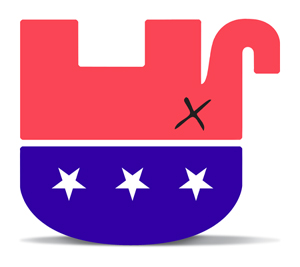All of which is a fairly long-winded way of saying that I've always held a soft spot for the GOP. In fact, I still vote for Republicans.
So it pains me a bit to see what's going on within today's party. Beginning in the late 60's and early 70's, the party started taking a turn to the right. As an ever-increasing number of very conservative Christians joined it, it began (slowly at first, and then with increasing speed) to turn further and further to the right, and to become something other than proponents of small government and fiscally conservative. Today, I doubt very much of Dan Evans (or Richard Nixon, for that matter) would be welcomed in the GOP.
Today, as I see it, there are three camps of Republicans, none of whom trust the others:
- The old-style small-government fiscal conservatives. The "Barry Goldwater Republicans" who would have counted my father among their members. This group includes "classical conservative" thinkers like William Buckley and George Will.
- The "neo-conservatives" who believe in big government, big spending, and are aggressively interventionist in their foreign policy. This group includes George W. Bush, Dick Cheney, and a bunch of talk-show hosts.
- The Christians who are very socially conservative and want the federal government to enforce their policies. This group includes Jerry Falwell, Pat Robertson and others.
In 1972 and again in 1980, the Democrats suffered overwhelming losses. After those losses, the Dems did some soul-searching. As a result, the Democrats began a slow move towards the political center, which culminated in the election of the flawed but brilliant centrist, Bill Clinton in 1992.
In 2006 and 2008, the Republicans suffered similar overwhelming losses, and have done some soul-searching. But their response seems to be moving even further to the right. In the 2008 presidential election, John McCain turned down an opportunity to seize the political middle ground by nominating Joe Lieberman, and instead chose the unqualified, completely inexperienced Sarah Palin. This year the chairman of the party was forced to apologize to a radio talk-show host. In New York this month, a moderate Republican candidate ended up endorsing the Democratic candidate after conservatives endorsed a third-party candidate.
Want an example of what might happen if the GOP's ideological purge continues? Look no further than my home, Kitsap County, Washington. In the 2006 primary election, Republicans voted out an incumbent county commissioner because she - oh, the horrors! - compromised on a land-use issue. The result? Their ideologically more pure replacement candidate got his hat handed to him by a twenty-something who was running in his first political campaign.
The Republican party seems to be suffering from internecine warfare, and may be falling apart before our eyes, going the way of the Whigs and becoming politically irrelevant.
And they have nobody to blame but themselves.




No comments:
Post a Comment